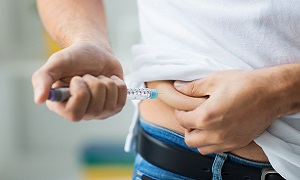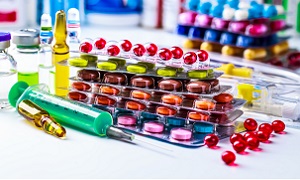Diabetes
Diabetes mellitus or diabetes is a metabolic condition characterized by high blood sugar (blood glucose) levels associated with other manifestations. It affects the way your body uses blood glucose.
Glucose is a fundamental source of energy for the cells that form your tissues and muscles. Hence, it is absolutely necessary for the body and is the main source of fuel for functioning of the brain.
Depending on the type of diabetes, the causes of the disease vary. It leads to high sugar levels in your blood, which may cause serious health complications. Insulin is a hormone that takes sugar into the cells for storage to be used for energy later.
Types of Diabetes
Chronic diabetes is of two types- Type 1 Diabetes and Type 2 Diabetes. There are also reversible diabetes conditions comprising prediabetes and gestational diabetes.
Type 1 Diabetes: It is an autoimmune disorder in which the immune system attacks and destroys the pancreatic cells. These cells make insulin. Nearly 10% of the population suffering from diabetes has Type 1 Diabetes.
Type 2 Diabetes: When the body becomes resistant to insulin and sugar builds up in the blood, the person suffers from Type 2 Diabetes.
Prediabetes: When the blood glucose is higher than normal but not high enough to categorize as Type 2 Diabetes, the person has Prediabetes.
Gestational Diabetes: When a pregnant woman has high blood sugar, she is suffering from Gestational Diabetes. The cause behind the gestational diabetes is the insulin-blocking hormone produced by the placenta. This type of diabetes resolves when the gestation period (duration of pregnancy) ends after the delivery of the baby.
Symptoms of Diabetes
The increase in the blood sugar level governs the symptoms of diabetes. Patients of Prediabetes and Type 2 Diabetes may not suffer from any symptoms initially. However, the patients experience the symptoms early in Type 1 Diabetes, which are severe. Let’s know the symptoms of Type 1 and Type 2 Diabetes.
- Increased hunger and thirst
- Blurred vision
- Fatigue
- Unexplained weight loss
- Irritability
- Sores that heal slowly
- Frequent urination
- Frequent infections like a skin infection
Causes of Diabetes
Type 1 Diabetes : The immune system plays a vital role in fighting against viruses and bacteria. However, in Type 1 Diabetes, the immune system attacks and destroys the cells present in the pancreas and responsible for producing insulin. Because of this, only a little insulin is present in your body. Also, the sugar builds up in the blood rather than getting transported to the cells. Genetic susceptibility and environmental factors are responsible for Type 1 Diabetes.
Prediabetes : Prediabetes often leads to Type 2 Diabetes.
Type 2 Diabetes : The cells acquire resistance against the action of insulin in this type of diabetes. The pancreas cannot make enough insulin to prevent this resistance. The sugar builds up in the blood rather than transporting to the cells for energy. Environmental and genetic factors cause Type 2 Diabetes. Obese people have higher chances of developing this type of diabetes. However, not every person suffering from Type 2 Diabetes is obese or overweight.
Gestational Diabetes : To maintain the pregnancy, the placenta produces hormones during the gestation period. Your cells become more resistant to insulin because of these hormones. The pancreas produces extra insulin to outscore this resistance. When the pancreas is not able to keep up very little amount of glucose enters the cells leaving behind much of it in the bloodstream. This causes Gestational Diabetes.
Diagnosis of Diabetes
The symptoms of Type 1 Diabetes appear early and often compel the patient to check for his/her blood glucose levels. Contrary to this, the symptoms of Type 2 Diabetes and Prediabetes are gradual. Screening of the following people is a must:
- People who are more than 45 years old must check for the symptoms of diabetes and undergo screening for blood sugar levels. If they find the blood sugar levels normal, then they must undergo screening every three years.
- A person who has Prediabetes must check for Type 2 Diabetes once in a year.
- People with a BMI (Body Mass Index) of more than 25 (23 for Asian-Americans) having additional risk factors like heart disease, high blood pressure, or abnormal cholesterol levels must undergo screening for diabetes.
- Women who suffer from gestational diabetes must check for diabetes every three years.
Treatment Options for Diabetes
A healthy and balanced diet along with an exercise regime is a significant part of managing diabetes and your health.
Treatment Options for all types of Diabetes.
Healthy diet
There is no specific diet that you must follow for diabetes. Vegetables, fruits, whole grains, and proteins are the core of a balanced and healthy diet. They are high in fiber and provide nutrition to the body. The diet is low in calories and fat while cutting down saturated fats and refined carbohydrates. You must take sweets once in a while.





